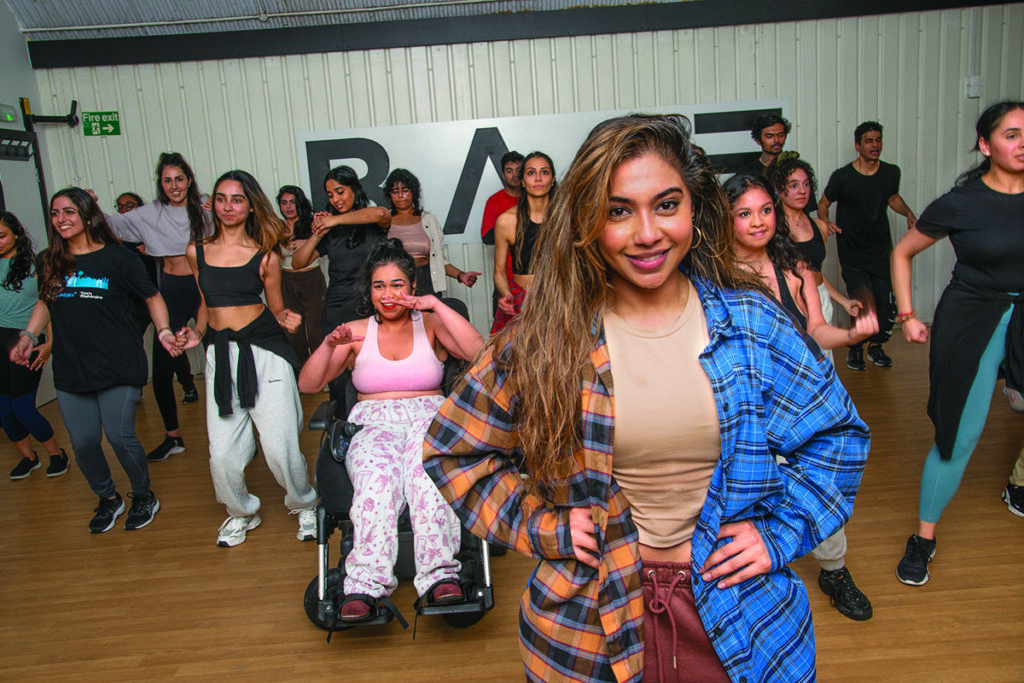
Dr Veena Babu on balancing clinical commitments with broadcasting and Bollywood dancing
Monday
I appear on Channel 5’s Jeremy Vine series to talk about the shortage of common medications around the UK, and how we can treat simple ailments at home. Then I make my way to east London for clinical work – a day of telephone consultations, face-to-face appointments and one home visit where I have to verify a death. I’ve been a doctor for nearly eight years, but this part of the job never gets any easier. The day finishes at 6pm and I manage to squeeze in a workout. This never fails to lift my mood.
Tuesday
I wake up early and head to the dance studio for 6.30am to prepare the choreography for my BollyFEELS dance class on Thursday. Being a GP has helped me to stay organised about managing my time and commitments during the week, a skill I’ve refined over the years. Then, on my way to work, I listen to the track I plan on teaching, to absorb the beats and the feel.
My clinic starts at 9am and the rest is a blur as it is really busy. When I was a junior doctor working in hospitals, I was always on my feet. But the role of a GP can often be sedentary unless you fit activity into your schedule, or you work in A&E. Today’s clinic finishes just after 5pm and I meet friends in central London for dinner.
Wednesday
My clinical setting today is a suburban practice where I cover sessions from 8am until 4pm. It is a rewarding day as I get to follow up patients who were poorly the week before. They have recovered considerably, and it’s always reassuring to know you were able to apply your clinical knowledge to improve someone’s health. The ability to provide continuity of care is truly one of the best things about being a GP.
After work I’m invited by WaterAid to attend Westminster to join Labour MP Fleur Anderson and a room full of experts for a plenary focusing on water sanitation, which includes discussions about the role of G7 nations in reducing infections crossing borders. I have never been to the UK Parliament before, and this is a moment I’ll never forget. It is an absolute privilege to contribute to health discussions in this way.
Thursday
The practice I’m at today is close to my heart as I trained there. I do the baby clinic and I love the predictable nature as it helps to break up my hectic week. I usually have two medical students with me; I enjoy teaching and watching them carry out examinations. At the end of the day, I head to the dance studio to teach students from all walks of life. Endorphins are high afterwards.
Friday
I end the week with an on-call shift in central London. This is usually busy and unpredictable as you see patients who are acutely unwell and need urgent treatment. The team is incredible and I love how supported I feel.
Saturday
In the morning I train a private student for a dance competition, then do community work to raise awareness for the charity South Asian Diabetes Association in memory of Helen (SADAH), which I set up after losing my mum to diabetes last year. This week we hold a free exercise class followed by a group session for those affected by diabetes. As a GP, I see the effects of poorly managed diabetes first hand, from retinal complications to foot disease. This allows me to directly impact the community.
Sunday
Sundays are reserved for church, family, cooking with my siblings, chores and prep for the coming week. Also, I reflect on the week and address what could be improved, or what I loved about that week. Being a GP has enabled me to design my life in a way that fulfils and excites me. This career has shown me that with passion and direction, the possibilities truly are endless.
Profile: Dr Veena Babu
Location: London
Roles: Locum GP doing 8-10 sessions a week; public health broadcaster (BBC Politics, ITV, GB News, Channel 5, Channel 4, BBC Radio); Bollywood choreographer (I:V Dance)
Hours worked: 40-45
Click here to access Pulse’s archive of Working life features
Pulse October survey
Take our July 2025 survey to potentially win £1.000 worth of tokens












absolutely phenomenal Dr Babu! very inspirational and well done.
I have looked at your website and it has a lot about exercise but I could not find much about what to eat. In type 2 diabetes what you eat is so important . In S. East Asians they get type 2 diabetes at much lower BMis, often in the normal range. It seems they have exceeded their personal ‘fatness’ thresh hold.
It is so important to change to a lower carb diet . Look at the work of Dr David Unwin. He is a GP that treats many of his type 2 diabetics with diet alone. He gets them to cut out all sugar, but also the starches as well, as these just get broken down to glucose as well. The patients carbohydrates just come from non starchy vegetables.
I realise that rice is a problem so if you can get your patients to switch to cauliflour rice instead, just mashed cauliflour substitutes quite well for curries. You will find that will lower their HBA1Cs more effectively than drugs. Dr Unwin has managed to put a lot of the type 2 diabetics into remission, using diet and exercise alone. Some of my diabetics achieved HBA1Cs of 5.5 using this method, down from the 12s.